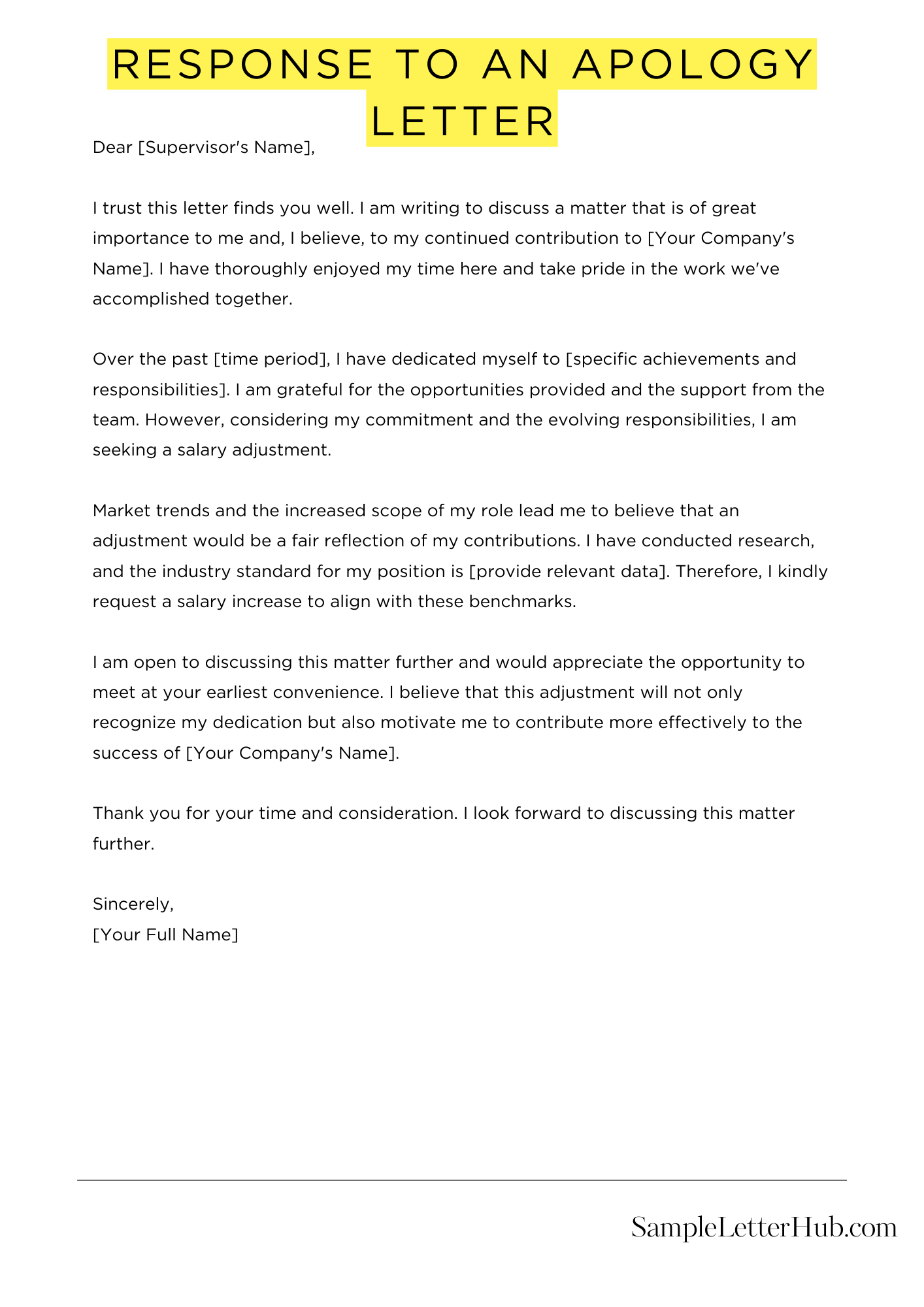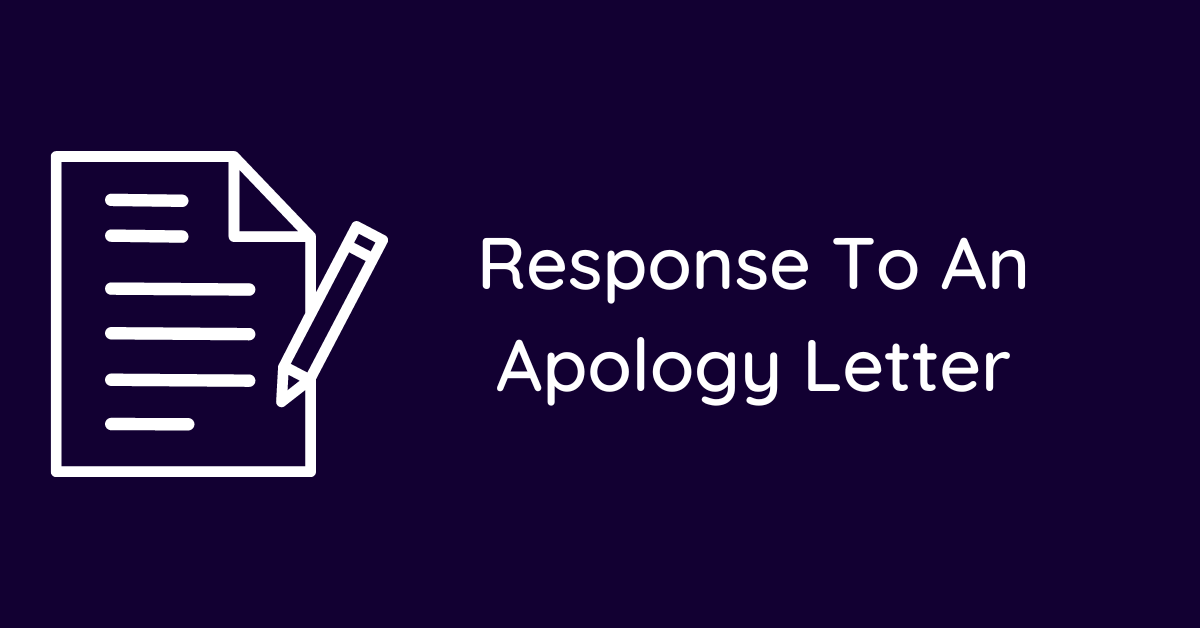Are you looking for the right words to respond to an apology letter? A response to an apology letter is a way to acknowledge the apology and express your feelings or thoughts about the situation.
It is a way to continue the conversation and move forward in a positive direction.
In this article, we will share templates, examples, and samples of response to an apology letters. Whether you’re responding to a personal or professional apology,
we’ve got you covered. Our goal is to make it easy for you to find the right words and convey your message effectively.
With our provided samples, you can easily craft a thoughtful and sincere response to any apology letter you receive.
We understand the importance of effective communication, and our templates will help you navigate the process with confidence.
Response to an Apology Letter
Dear [Recipient Name],
I received your apology letter and appreciate your willingness to take responsibility for your actions. I understand that you were going through a difficult time, and I am willing to forgive you for your behavior.
However, I do want to express that your actions hurt me deeply. I felt betrayed and disrespected, and it took me a long time to process my emotions. I am still working through some of the pain, but I am committed to moving forward.
I hope that we can rebuild our relationship, but it will take time and effort from both of us. I am open to talking to you about what happened and how we can prevent it from happening again.
In the meantime, I need some space to heal. I would appreciate it if you would respect my need for time and distance.
Thank you for your understanding.
Sincerely,
[Your Name]
Sample Response To An Apology Letter
Dear [Name],
Thank you for reaching out to me and apologizing for your actions. I appreciate your willingness to take responsibility and acknowledge the hurt you caused.
While I understand that you regret your behavior, I must admit that the apology does not fully address the impact of your actions on me. The words and actions you used were deeply hurtful, and I am still struggling to process the pain they caused.
I need time to reflect on your apology and consider whether I am ready to accept it. I would also like to request that you take some concrete steps to demonstrate your sincerity and commitment to making amends. These steps could include:
Acknowledging the specific harm you caused and expressing remorse for it.
Offering a genuine and sincere apology in person or through a written letter.
Taking responsibility for your actions and refraining from making excuses or blaming others.
Respecting my boundaries and giving me the space I need to heal.
Demonstrating through your actions that you have learned from your mistake and are committed to treating others with respect and kindness.
I understand that this may take time and effort, but I believe it is essential for me to feel truly forgiven and to move forward.
Once I have had time to process your apology and consider your actions, I will let you know if I am ready to accept it. In the meantime, I would appreciate it if you would give me the space I need.
Sincerely,
[Your Name]
Apology Acceptance Letter
Dear [Recipient Name],
I am writing to express my sincere apology for the offense I caused you and your organization with my recent actions. I deeply regret the pain and embarrassment I have brought upon myself and others.
I fully acknowledge that my behavior was unacceptable and that I have no excuse for my actions. I take full responsibility for my words and deeds, and I am committed to making amends for the harm I have caused.
I understand the seriousness of the situation and I am deeply sorry for the damage I have done to our relationship. I value your respect and trust, and I am determined to regain it.
I have taken steps to address the underlying issues that led to my behavior. I have sought professional guidance and am actively working on improving my communication and interpersonal skills.
I am committed to rebuilding our relationship and restoring the trust that has been broken. I am open to any suggestions or conditions that you may have for me to make amends.
I humbly request your forgiveness and a chance to prove that I can be a valuable member of the team. I am eager to contribute positively to the organization and to make up for the mistakes I have made.
Thank you for your time and consideration.
Sincerely,
[Your Signature]
Letter For Accepting An Apology With Grace
Dear [Recipient Name],
I received your recent letter of apology, and I want to acknowledge its receipt. I appreciate your willingness to take responsibility for your actions and offer an apology.
While I understand that you may have had your reasons for behaving as you did, I cannot condone your actions. The harm you caused was significant, and it is something that I will not easily forget.
However, I recognize that everyone makes mistakes, and I believe that it is important to give people the opportunity to learn from their errors. I am willing to accept your apology with grace, provided that you are truly remorseful and committed to making amends.
I would like to suggest that we meet in person to discuss this further. I believe that it is important for us to have an open and honest conversation about what happened and how we can move forward.
I am available to meet at your earliest convenience. Please let me know when you are free.
Thank you for your apology. I hope that we can resolve this matter amicably and rebuild our relationship in the future.
Sincerely,
[Your Signature]
Funny Reply Letter To Sorry
My Dearest Apologizer,
I received your heartfelt missive expressing your profound regret for the aforementioned transgression. While I appreciate the sentiment, I must confess that your apology has left me in a state of bewilderment.
Allow me to dissect your words with surgical precision. You claim to be deeply sorry for your actions. Yet, I cannot help but wonder if your remorse is truly genuine. After all, you have yet to provide a comprehensive explanation of your heinous behavior.
Furthermore, you state that you never intended to cause harm. However, your actions speak volumes. The wound you inflicted upon my psyche is still fresh and throbbing. It is clear that you did not fully consider the consequences of your deeds.
Your apology is akin to a Band-Aid on a gaping wound. It may temporarily soothe the surface, but it fails to address the underlying damage. I require more than mere words to mend my shattered trust.
I propose a more creative solution. Instead of simply apologizing, why don’t you offer to perform a series of ridiculous and humiliating tasks? This could include:
Publicly singing Baby Shark while wearing a clown costume
Dancing the Macarena on top of a moving vehicle
Eating a live worm with a straight face
By undertaking these challenges, you will demonstrate your true repentance and make amends for your past transgressions.
Until such time as you are willing to embrace these measures, I must respectfully decline your apology. Your actions have left an indelible mark on my soul, and I will require a more substantial form of atonement.
With a heavy heart,
The Unforgiving One

How to Write a Response to an Apology Letter
Receiving an apology letter can be a complex and emotional experience. It is important to take the time to process your feelings and decide how you want to respond.
Acknowledge the Apology
Begin your response by acknowledging the apology. This shows that you have received and understood the letter. You can simply say, “Thank you for your apology.” or “I appreciate you reaching out to me.”
Express Your Feelings
Once you have acknowledged the apology, take some time to express your feelings. Be honest about how the situation has affected you. Use “I” statements to convey your perspective. For example, you could say, “I was hurt by your actions” or “I felt betrayed by your words.”
Consider the Apology’s Sincerity
It is important to consider the sincerity of the apology. Does the letter take responsibility for the actions and acknowledge the impact they had on you?
Does it offer a specific plan for making amends? If the apology seems genuine, you may be more likely to accept it.
Set Boundaries
If you accept the apology, it is important to set boundaries to protect yourself from further harm.
This could involve limiting contact with the person who apologized or setting clear expectations for future behavior. Explain your boundaries clearly and respectfully.
Request Specific Actions
In some cases, you may need to request specific actions from the person who apologized. This could involve a change in behavior, a public apology, or a financial settlement. Be clear about what you need to move forward.
Give Yourself Time
It is important to give yourself time to heal after receiving an apology. Do not feel pressured to respond immediately. Take the time you need to process your feelings and make a decision that is right for you.
Seek Support
If you are struggling to cope with the situation, do not hesitate to seek support from a friend, family member, or therapist. They can provide you with emotional support and guidance as you navigate this challenging time.
FAQs about Response To An Apology Letter
How do I respond to an apology letter?
When responding to an apology letter, it is important to be genuine and sincere. You should express your appreciation for the apology and let the person know that you accept it.
You may also want to share how their actions affected you and what you need from them to move forward.
What should I include in my response to an apology letter?
Your response to an apology letter should include the following:
- An acknowledgment of the apology
- An expression of your appreciation
- A statement of your acceptance of the apology
- A description of how their actions affected you
- A statement of what you need from them to move forward
How do I respond to an apology letter from someone I don’t know?
If you receive an apology letter from someone you don’t know, it is important to be polite and respectful.
You may want to start by thanking them for their apology and letting them know that you appreciate their willingness to take responsibility for their actions.
You can then share how their actions affected you and what you need from them to move forward.
How do I respond to an apology letter that I don’t accept?
If you receive an apology letter that you don’t accept, it is important to be honest and direct. You should let the person know that you do not accept their apology and explain why.
You may also want to share how their actions affected you and what you need from them to move forward.
How do I respond to an apology letter that is insincere?
If you receive an apology letter that you believe is insincere, it is important to be assertive and direct. You should let the person know that you do not believe their apology is sincere and explain why.
You may also want to share how their actions affected you and what you need from them to move forward.
Resignation Letter To Temp Agency (5 Samples)

